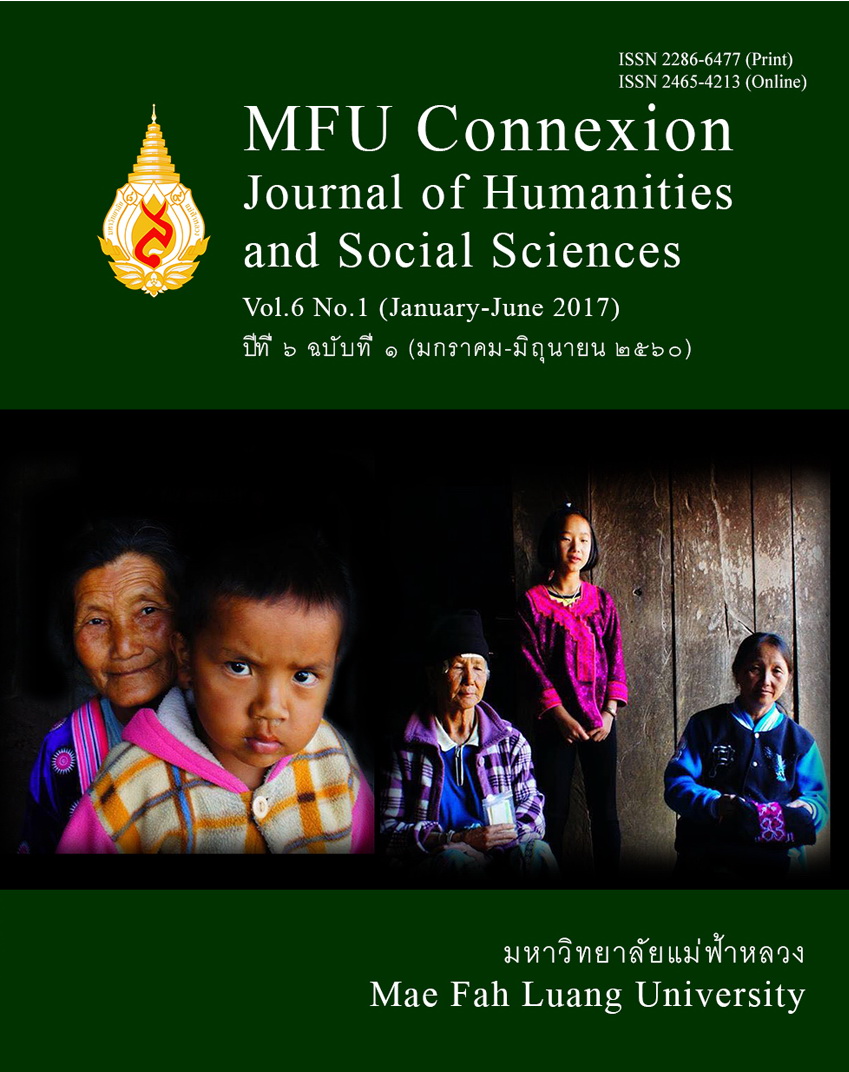Thai Students’ Perceptions towards Self-Study and the Use of a Self-Access Language Learning Center
Main Article Content
Abstract
The purpose of this research was to investigate Mae Fah Luang University (MFU) students’ perceptions towards self-study and the use of the Self-Access Language Learning Center (SALLC). The main research questions include: 1) what are students’ attitudes towards the use of SALLC at MFU, and 2) what are the factors that promote students’ use of the SALLC? This study adopted a mixed-method approach which employed two research instruments: a questionnaire and semi-structured interviews. Using convenience sampling, the questionnaire respondents consisted of 215 students who used the services at SALLC. Purposive sampling was employed to select eight respondents to participate in the group interviews.
The key findings of this study can be summarized into two main aspects related to the primary research questions. Firstly, using the SALLC services led to participants’ positive attitudes towards English learning in terms of cognitive, affective, and behavioral aspects. Most students had positive attitudes towards the services offered at the SALLC, which included facilities, consultation, coaching, foreign language activities, and self-study materials. Secondly, factors indicated as those that attracted students to use the center were the positive environment and pleasant surroundings.
Article Details
Copyright
Connexion: Journal of Humanities and Social Sciences has an exclusive right to publish the accepted articles in any form. However, the author retains the following rights:
1. The right to the ownership of the article;
2. The right to use all or part of the article in his/her other works;
3. The right to re-produce the article for personal use or for use in the author’s organisation, in which case the author must obtain permission from Connexion: Journal of Humanities and Social Sciences;
4. The right to make copies of all or part of the work for educational use or for the author’s use in classroom teaching; and
5. The right to include the work (both the preprinted and printed versions) in an institutional repository.
References
Abidin, M. J. Z., Pour-Mohammadi, M. P., & Alzwari, H. (2012) EFL students’ attitudes towards learning English language: The case of Libyan secondary school students, Asian Social Science, vol. vol. 8, no. 2, pp. 119-134.
Abidin, M. J. Z., Pour-Mohammadi, M. P., Wongchana, K., & Yee, K. M. (2012) Students' motivation for and attitudes towards self-access language learning center, Journal of Education and Practice,vol. vol. 3, no.3, pp. 69-75.
Allport, G. W. (1935) ‘Attitudes’, in C. Murchison (Ed.), Handbook of social psychology, Worcester, Mass: Clark University Press.
Cheng, H., & Lin, N. C. (2010) Exploring students’ perceptions of self-access English learning, Procedia Social and Behavioral Science, vol. 2, pp. 2676-2680.
Farani, T. S. & Fatemi, H. A. (2014) The impact of teacher’s self-disclosure on students’ attitude towards language learning in a foreign language context, Theory and Practice in Language Studies,vol. vol. 4, no. 11, pp. 2415-2422.
Holec, H. (1981) Autonomy and foreign language learning, Oxford: Pergamon.
Hosseini, S. B., & Pourmandnia, D. (2013) Language learners’ attitudes and beliefs: Brief review of the related literature and frameworks, International Journal on New Trends in Education and Their Implications, vol. 4, no. 4, pp. 63-74.
Javdani, F., Mahboudi, F. H., Ghafoori, N., & Abdulla, B. A. (2011) EFL students’ attitudes towards self-access language learning center (SALC): The case of Iranian ESP students, The Journal of Applied Linguistics, vol. 4, no. (2), pp. 64-96.
Johnson, B. J. (2006) Foreign language learning: an exploratory study on the external and internal influences affecting success, Master’s thesis, Baylor University.
Klassen, J., Detaramani, C., Lui, E., Patri, M., & Wu, J. (1998) Does self-access language learning at the tertiary level really work?, Asian Journal of English Language Teaching, vol. 8, pp. 55-80.
Little, D. (1989) Self-access systems for language learning, Dublin: Authentik/CILT.
Little, D. (1991) Learner autonomy 1: definitions, issues and problems, Dublin: Authentik.
Littlewood, W. (1996) “Autonomy”: An anatomy and a framework, System, vol. 24, no. 4, pp. 427-435.
Malcolm, D. (2011) Learner involvement at Arabian Gulf University self-access centre, Studies in Self-access Learning Journal, vol. 2, no. 2, pp. 68-77.
Mina, L. T. (2013) Perceptions towards the use of a self-access centre in a university in Northern Thailand, Master’s thesis, The British University in Dubai.
Pickens, J. (2005) ‘Perceptions and attitudes of individuals’, in N. Borkowski (ed.), Organizational behavior in health care, New York: Jones & Barlett Publishing.
Rahimi, M., & Hassani, M. (2012) Attitude towards EFL textbooks as a predictor of attitude towards learning English as a foreign language, Procedia-Social and Behavioral Sciences, vol. 31, pp. 66-72.
Salvia, O. S., (2000) Integrating a self-access system in a language learning institution: A model for implementation, Links & Letters, vol. 7, pp. 95-109.
Sheerin, S. (1991) State of the art: Self-access, Language Teaching, vol. 24, no. 3, pp. 143-157.
Sturtridge, G. (1992) Self-access: Preparation and training, Manchester: British Council.
Sudsa-ard, S. (2013) The learner factors: Guide for successful language learning, Thammasat Review, vol. 16, no. 3, pp. 41-52, [Online], Available: https://tujournals.tu.ac.th/thammasatreview/detailart.aspx?ArticleID=135 [18 November 2016]
Tang, G. & Yang, G. (2000) Learning English through self-study by new arrival children, Education Journal, vol. 28, no. 2, pp. 15-34.
Wenden, A. (1991) Learner strategies for learner autonomy: Planning and implementing learner training for language learners, New York: Prentice Hall International.


